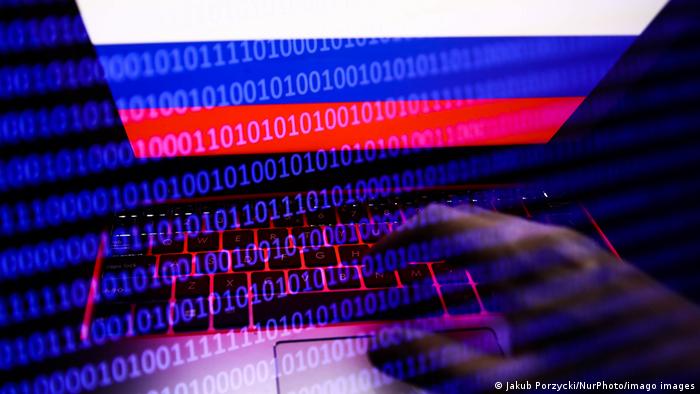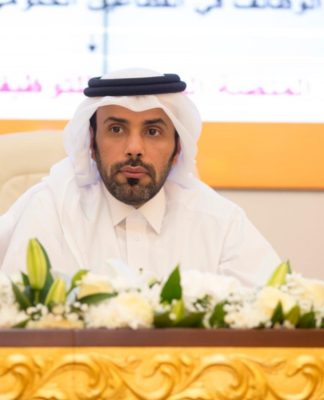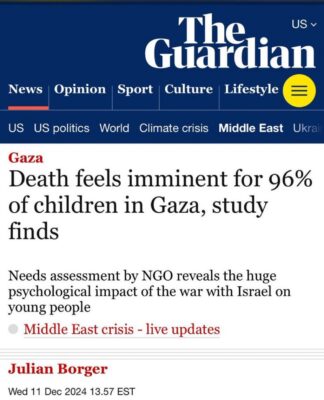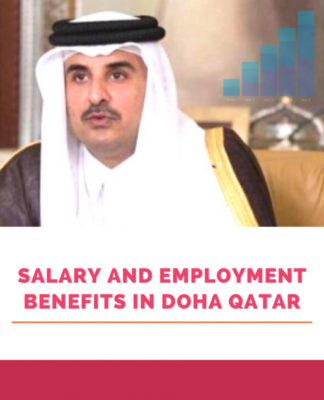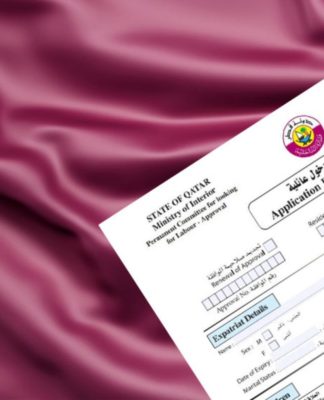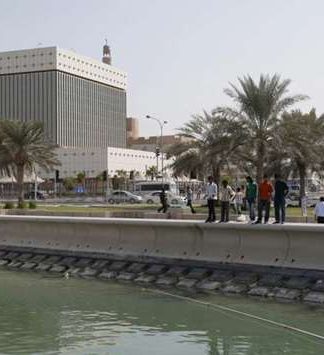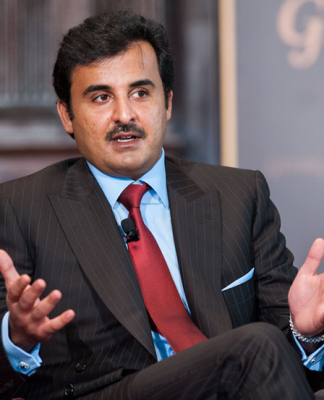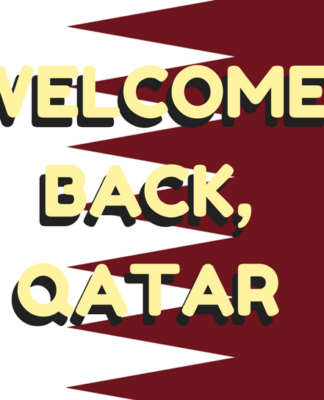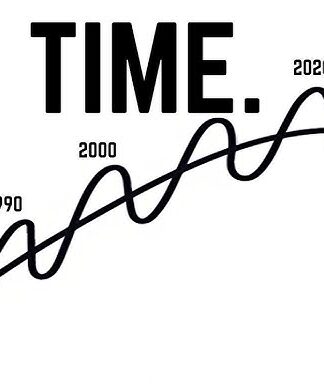GERMANY
Russian disinformation threat looms large over cold German winter
Amid the energy crisis, Russia could exploit fears of soaring prices and gas shortages to stoke social unrest in Germany, officials warn. They have reason to be concerned, researchers say.
Symbolic image of Russian cyberhacking activities
As Germany heads into a winter of energy rationing, officials warn that Russia could spread disinformation online to sow social unrest in the country.
That is according to the chair of the German Bundestag’s parliamentary oversight panel, which monitors the work of Germany’s national intelligence services.
“The situation is serious,” Konstantin von Notz, a member of parliament for the environmentalist Green Party, told DW. The Greens, together with Chancellor Olaf Scholz’s center-left Social Democrats and the neoliberal Free Democrats, form Germany’s ruling coalition government.
Recent incidents, von Notz said, “have shown, once again, that Germany is susceptible to Russian influence operations.”
German MP Konstantin von Notz
Konstantin von Notz chairs the German Bundestag’s powerful parliamentary oversight panel
His warning comes as people in Germany are increasingly feeling the impact of soaring energy prices, following Moscow’s decision to cut gas supplies to Germany in retaliation for Western sanctions.
Earlier this year, as part of an effort to cripple Russia’s economy over its invasion of Ukraine, the European Union imposed wide-ranging penalties.
But as winter looms, officials fear that Russia will attempt to stoke fears of gas or food shortages in Europe’s largest economy, to produce a backlash against the measures.
Play Video8:05 min
Fact check: How to see through Russia’s war propaganda
“Our intelligence services have, for a long time, been observing that pro-Russian actors organize campaigns on social networks like Telegram with the goal of poisoning public debates and dividing our society,” von Notz said.
“That is why, in the situation we’re in, we need to pay particular attention to what they are doing — and the story around the distorted video of Annalena Baerbock illustrates that.”
The Baerbock case
Von Notz was referring to an incident surrounding German Foreign Minister Annalena Baerbock, which provides a glimpse of what could be to come.
In late August, Baerbock said during a panel discussion in Prague that she would continue to support besieged Ukraine, “no matter what my German voters think.”
Her remark was part of a long answer, during which she also stressed, for example, that her government would help people in Germany cope with soaring costs of living.
But within hours, pro-Russian accounts began posting video clips of the isolated sentence on Telegram, often adding misleading fragments or flawed headlines which distorted the original meaning, according to an analysis by the Disinformation Situation Center, a Europe-based coalition of researchers tracking Russian disinformation, which was shared with DW.
German Foreign Minister Annalena Baerbock
German Foreign Minister Annalena Baerbock has repeatedly been the target of Russia-led disinformation campaigns
Soon after, the clips spilled over onto other social media platforms such as Facebook, Twitter, Instagram and YouTube — where they were shared by members of Germany’s far-right Alternative for Germany (AfD) party and the socialist Left party, as well as far-right extremist accounts.
That is how the clips reached a German audience, according to the researchers. One day after Baerbock made her remarks, a hashtag demanding that she step down was trending on German-language Twitter.
“This incident shows that for disinformation to spread, a synergy between Russian or pro-Kremlin actors and domestic actors in Germany is crucial,” said Julia Smirnova of the Institute for Strategic Dialogue think tank, which contributed to the analysis of how the clips spread.
Focus on the war in Ukraine
Attempts by Russia’s government to sway public opinion in Europe’s largest economy are not new: Since the early days of the Cold War, Germany has been a key target for Russian and Soviet information operations.
Over the last ten years, the rise of social media platforms supercharged the phenomenon. Between 2015 and 2021 alone, researchers tracked over 700 Russian campaigns targeting Germany.
They spread false or misleading information on dozens of different issues ranging from immigration to human rights while pursued a similar goal — deepening existing divisions and creating new ones.
That changed when Russian tanks started rolling into Ukraine in February. Since then, Moscow’s disinformation efforts have almost exclusively focused on the war, researcher Smirnova said.
One goal, she added, is to paint Europe’s energy crisis as a consequence of the West’s solidarity with Ukraine.
“The narrative pushed by Russian propaganda is that people in Germany have to feel cold because of Ukraine,” Smirnova said, “and now that winter is approaching, this narrative has more potential than ever to resonate with people who are legitimately worried.”
A difficult winter ahead
Other researchers echo her assessment.
Pia Lamberty of the German-based research organization CeMAS said she expected Russia to further ramp up its efforts targeting Germany this winter.
“Experience has taught us that Russia tends to increase disinformation in times of social tensions,” such as when hundreds of thousands of refugees came to Germany from war-torn Syria in 2015, she said.
Lamberty, a social psychologist, added that whenever countries are facing significant social tests such as Germany’s looming winter of potential deprivation, “one possible outcome is that people show more solidarity.”
But, she stressed, “often, the opposite happens and you see a rise in nationalism and self-interest.
“Disinformation campaigns tend to have a strong understanding of the human psyche and they try to feed into those tendencies,” she added.
Protesters in Leipzig, Germany demonstrating against cost of living increases
Protesters at a right-wing demonstration against rising prices in the German city of Leipzig on September 5, 2022
So far, protests against the rising cost of living, and exploding energy prices in particular, have been relatively small.
But, as the first cold nights of fall descend on the country, and buildings are about to become cooler and streets darker, parties on both the far left and right end of the political spectrum have announced a “hot autumn” with regular Monday demonstrations.
And officials including MP Konstantin von Notz worry that pro-Russian actors could attempt to radicalize the protests with disinformation campaigns.
“To be clear: Everyone in our country has a right to demonstrate against soaring prices and take this protest to the streets, thank God,” he said.
“But every one of us — politicians, journalists, citizens — has to be very careful that we are not being instrumentalized by actors that do not mean well for our society.”
While you’re here: Every Tuesday, DW editors round up what is happening in German politics and society. You can sign up here for the weekly email newsletter Berlin Briefing.
Date 12.09.2022
Author Janosch Delcker
Related Subjects Energy, Fake news
Keywords disinformation, Ukraine war, fake news, cyberwarfare, energy, gas
Feedback: Send us your feedback.
Print Print this page
Permalink https://p.dw.com/p/4GkEq









